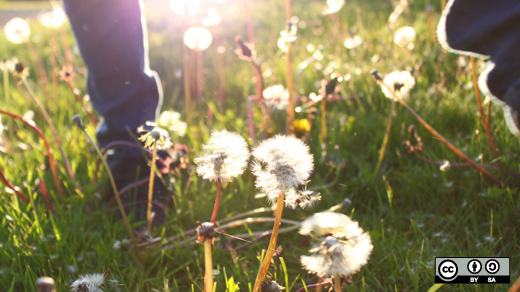We're at a particularly interesting time in technology, the Internet, the open source movements, and what accessibility means. We get the ability to be a lot of different people that were not possible before: web designer, cloud architect, open source project manager, open source developer, and more. Working from home is viable with an Internet connection in a way that wasn’t available in the early 1990s. And, when was the last time you looked at the Yellow Pages? (I was on vacation in the Bahamas and was curious. That was it for me.)
Also available now, with the Internet in our pocket at all times, are different ways to express ourselves and communicate. The way my grandparents use text messaging is different from the way that my teenage cousin uses her phone, but if you put their two messages side by side, can you tell who sent which message? I've recieved a text message from an older relative that had the same indecipherable text speak as a text message from my 14 year old cousin—and it wasn't because of autocorrect. I can justify this to myself by reasoning that it’s about learning a technology—that this new technology has no attachment to proper English and that perhaps these two just have the same personal communication style. But, this theory has a lot of holes in it, which I dislike.
It’s true, the ways in which we communicate have become different; I myself have trouble motivating myself to write things that are longer than a haiku in one sitting, and I know I'm not the only one. The valuable thing now is not about being ON all the time, it's about protecting our ability to focus. You can have all of the productivity tools in the world but your writing will be scattered and your communications won't be as clear if you're constantly distracted by the world around you. This is one of the biggest challenges of any generation using these new technologies.
We figured out how to overstimulate ourselves very effectively, and in the end we call it multi-tasking and work. We praise and give raises to the people who can pull it off better than the people who work slowly and methodically on single tasks.
I don't think this is going to be our undoing as a culture, and I certainly don't think we need to get all Pygmalion on everyone about how learning to code is going to fix all of our problems. Learning to code gives you an ability to think through problems, but it certainly doesn't give you focus. The practice of coding as a profession gives you practice in solving puzzles, and it’s very satisfying at the end of the day to be able to point to the ‘things you solved’. Coding as a job also opens other doors, but it’s one piece of a larger puzzle.
And if you’re working on an open source project, you are gaining more experience by working with many different kinds of people in different environments, which is even more valuable when you realize that the community is self-selected and most people are volunteers. They're not being paid by lines of code written for a project, they're doing it because they value the project and their ability to contribute to the community. There are other reasons too, and I don't mean to proscribe everyone's reasons in the same way, but at the end of the day, you're working with people you like on something you believe in. That part isn't going to change.
What will change is that the people who are able to focus and fight being able to do a million things at once will find it easier to keep going. We talk a lot about burnout in our communities and how to work against it—by finding other things in our lives that keep us stable and happy that aren't tied to our work. We ask each other and ourselves things like: How can I be on-call for years at a time? When can I stop saying yes to everything that comes my way?
Do you remember waiting by the phone for someone to call, or even public telephones at all? Changing times and technologies is not about who we're being at work, it's about who we're being in a world that can teach us how to best draw the lines between or blur the lines between our work and home, the casual and formal, and our professional and personal lives. For me, I've made a decision to get back into scuba diving for a different experience of the world. It's also pretty difficult to be online at 50 feet underwater. I come back refreshed and with a greater, broader perspective than before, beyond a particular moment at work or on the Internet.
I’d love to hear what you think. What are the other big issues that we need to confront on the lines of the personal and professional? On the lines of real life and online life?






4 Comments